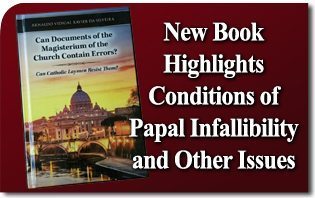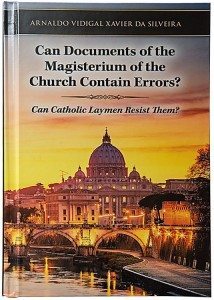 Is the Pope always infallible in everything he says or does? What are the conditions and limits provided by the First Vatican Council for the Pope to exercise the charisma of infallibility? Can Catholic faithful with sufficient doctrinal formation resist documents that clearly contradict Catholic tradition?
Is the Pope always infallible in everything he says or does? What are the conditions and limits provided by the First Vatican Council for the Pope to exercise the charisma of infallibility? Can Catholic faithful with sufficient doctrinal formation resist documents that clearly contradict Catholic tradition?
These are some of the urgent questions answered in a new book titled, Can Documents of the Magisterium of the Church Contain Errors? Can the Catholic Faithful Resist Them? The author of the recently published work is Brazilian Catholic intellectual Arnaldo Vidigal Xavier da Silveira, a leading specialist in the matter. The book is a collection of studies that were originally published in the Brazilian Catholic monthly magazine Catolicismo in the wake of the great doctrinal and disciplinary confusion immediately after the Second Vatican Council. They have never been contested.
Now, the American Society for the Defense of Tradition, Family and Property (TFP) has translated these important considerations into English and compiled them into a book it is making available to the Catholic public.
Extremely Relevant and Current Topics
A quick summary of the book’s chapters will give an idea of how timely this book is for the present days.
The first study is titled, “What Is the Doctrinal Authority of Pontifical and Conciliar Documents?” The author explains the conditions and limits of the infallibility of the Pope, councils and bishops throughout the world. He distinguishes between the infallible Extraordinary Magisterium and the Ordinary Magisterium, which is infallible only through the continuity of the doctrine taught.
The next chapter─“Not Only Heresy Can Be Condemned by Ecclesiastical Authority”─deals with sins against Faith, which, contrary to popular belief, are not limited to heresy but cover every statement or persistent doubts regarding a doctrine the Church has clearly expounded as something to be believed.
Gestures and Omissions Also Teach
One of the most original studies of the collection is on the many ways heretics can manifest their errors. The study, “Acts, Gestures, Attitudes and Omissions Can Characterize a Heretic,” makes it clear that words alone do not define heresy.
Indeed, man does not teach or learn only through the written or oral word but also by actions, gestures, omissions, and attitudes. For example, a teacher can discipline a class without giving a written or oral order. A father or mother by their facial expression can approve or disapprove a child’s behavior.
The Magisterium of the Church can be taught in a similar manner. A bishop, for example, teaches veneration when he incenses the Blessed Sacrament. There is clearly a doctrine behind his gesture.
Conversely, a person who shows no veneration to the Blessed Sacrament or treats relics with contempt is expressing doubts or opposition to traditional Catholic doctrine, albeit without saying it.
Answering Objections
The next chapters of the book deal with reacting to error. One will find a refutation to the widely held mentality that combating error or admonishing a person in error is uncharitable. Quite the contrary, a true act of charity and an effective pastoral policy should consist in helping people abandon error or sin. This should be done in a firm yet charitable fashion making no concessions.

The study, “Can a Catholic Reject Humanae Vitae?” shows how the Church can express a dogma or impose an obligation even through its Ordinary Magisterium. Such is the case with the Encyclical Humanae Vitae on contraception.
More complex but of paramount importance is the subsequent study, “Can There Be Error in Documents of the Magisterium?”
Contrary to what many could imagine, theologians fully agree that a magisterial document can contain errors when it does not meet the conditions for infallibility. To hold to the truth, the faithful can always have recourse to previous documents of the Magisterium in order to solve their doubts.
Public Resistance to Decisions of Ecclesiastical Authority
Finally, the book concludes with a practical question: “Public Resistance to Decisions of Ecclesiastical Authority.”
With the full respect and submission due to Church authorities, Doctors of the Church and great theologians alike show that it is not only possible but can also be obligatory to resist orders or guidance from ecclesiastical authority when such attitudes are opposed to longstanding Church tradition. Saint Thomas Aquinas presents the classical case of Saint Paul resisting Saint Peter regarding the maintenance of Jewish customs from the synagogue.
The book’s beautiful cover and excellent presentation is a fitting complement to the author’s clear and precise style. Above all, the timeliness of the subjects broached make this new work a must-read for all Catholics.

